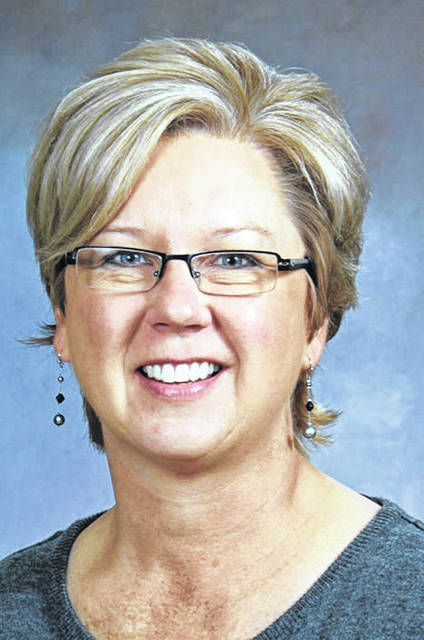
“You are a speech therapist for babies and toddlers? They don’t even talk yet!” is what I hear on a regular basis from people when they find out that I work in early intervention. It might surprise you to learn that talking does not start with saying words. The physical act of talking — moving your lips, tongue and jaw as you make sounds — is only a small part of communicating. It is easy for most people to see what a child has to do before he learns to walk. Parents know that their child must learn to sit up, pull to stand, and cruise back and forth between furniture before she actually walks. But the skills that come before talking are not as well-known.
I am a licensed speech therapist who specializes in pediatrics at Shelby County Early Intervention, which is a free program through Shelby County Board of Developmental Disabilities. Most of my clients are 24 to 36 months old, but our program serves children birth through age 3 and their families. A family seeks services through early intervention for a variety of reasons. Maybe during the holidays a relative recognized that there was a delay in a child’s development. Sometimes pediatricians refer a patient to our program. Other times the parents make the initial call on their own. Early intervention services are for children under the age of 3 who display a significant delay in any area of development. The areas we assess include communication, fine motor, gross motor, social-emotional and self-help skills. We have two developmental specialists on staff as well as a speech therapist, two occupational therapists who also work in our preschool program and a physical therapist.
My job description says “speech therapist,” but often what I do does not look like therapy. As a matter of fact, sometimes I don’t even work on speech (at least not at first). A better title might be “communication play partner” or “parent trainer for toddler interactions.”
When I first meet a family, I observe what kind of toys the child likes and then try to join in his play. Initially, I do not expect anything in return, except for the child to stay with me and his caregiver in a play activity. Initially, I might not even say anything at all as we play. I tell parents, “If he sees me as ‘the lady who is trying to get me to talk’, he may avoid me altogether!” I describe my therapy style as relationship-based. If we don’t build a relationship first, the child will not be willing to take a chance in our sessions and try something that is hard for him to do. Young children learn best through movement and sensations, so that is how we teach them. That is why most toddlers run, throw, dump everything and love to get dirty! That is also why rough-house play, silly interactions and repetitive activities often get the most communication out of toddlers. Games like “I’m gonna get you” or “peek-a-boo” encourage a nice social relationship between a parent and child and are important for healthy development. And of course, music is always wonderful for a child’s developing brain. When we interact with children while they are engaged in what interests them, we can be more successful and get our goals accomplished quickly. So, in early intervention, we put away the drills and flashcards and get down on the floor and play with babies and toddlers in fun, playful interactions and we teach caregivers how to do the same thing in their daily interactions with their child. In other words, I get paid to act like a 2-year-old!
So, what comes before words? Reaching, waving, pushing away, patting, pulling, pointing and shaking their heads yes or no are all nonverbal ways toddlers might communicate. These communication attempts come before actual talking. Even babies as young as 10 months old will show toys, reach to be picked up or push an item away to refuse it. Many times I encounter families who are focused on a goal of talking when their child is not yet reaching, pointing or even making playful sounds. This means that parent education is also a very important part of my job.
Another skill that precedes talking is imitation. Whenever a child is not performing a certain skill or meeting an expected milestone, we always look at what comes before that skill and focus on teaching the prerequisite skill first. So, what comes before using sentences? Using phrases. Before that? Using words. The following skills are examples of what I look for when children are not yet using words spontaneously: Do they imitate simple words, silly words like “Uh oh!” or even sounds such as a fake cough or grunting? Do they imitate actions with toys such as banging a drum or patting a baby? How about imitating simple actions in play, like shaking a rattle or tapping two blocks together? As you can see, talking is not always the most appropriate place to start when a child has delayed communication skills.
Parents can be the best speech therapists for their children if they are given the correct strategies to use in everyday activities at home. We will save those strategies for the next article in this two part series.
If you have a concern about your child’s development and he or she is under the age of 3, you can fill out a referral online at ohioearlyintervention.org or call Ohio Early Intervention at 800-755-4769. All services are free and available to any resident of Ohio.




